Research Methodology: Managing Changes in Healthcare Organisation
VerifiedAdded on 2020/07/23
|12
|3637
|68
Report
AI Summary
This report outlines the research methodology employed to investigate the significance of managing changes within healthcare organizations, particularly focusing on improving the quality of services. It details the research philosophy, adopting an interpretivism approach, and the research design, utilizing a descriptive method to gather in-depth information about managing changes in the NHS. The report discusses the inductive research approach used to analyze the impact of changes, the secondary data collection method involving NHS-associated trusts, and the probability sampling technique applied. Data analysis methods are also mentioned, emphasizing how collected data is converted into meaningful insights to answer research questions, alongside ethical considerations, reliability, validity, and research limitations. The study uses organizational semiotics to understand information sharing regarding healthcare services, ultimately aiming to identify the impact of managing changes on the quality of services within healthcare organizations.
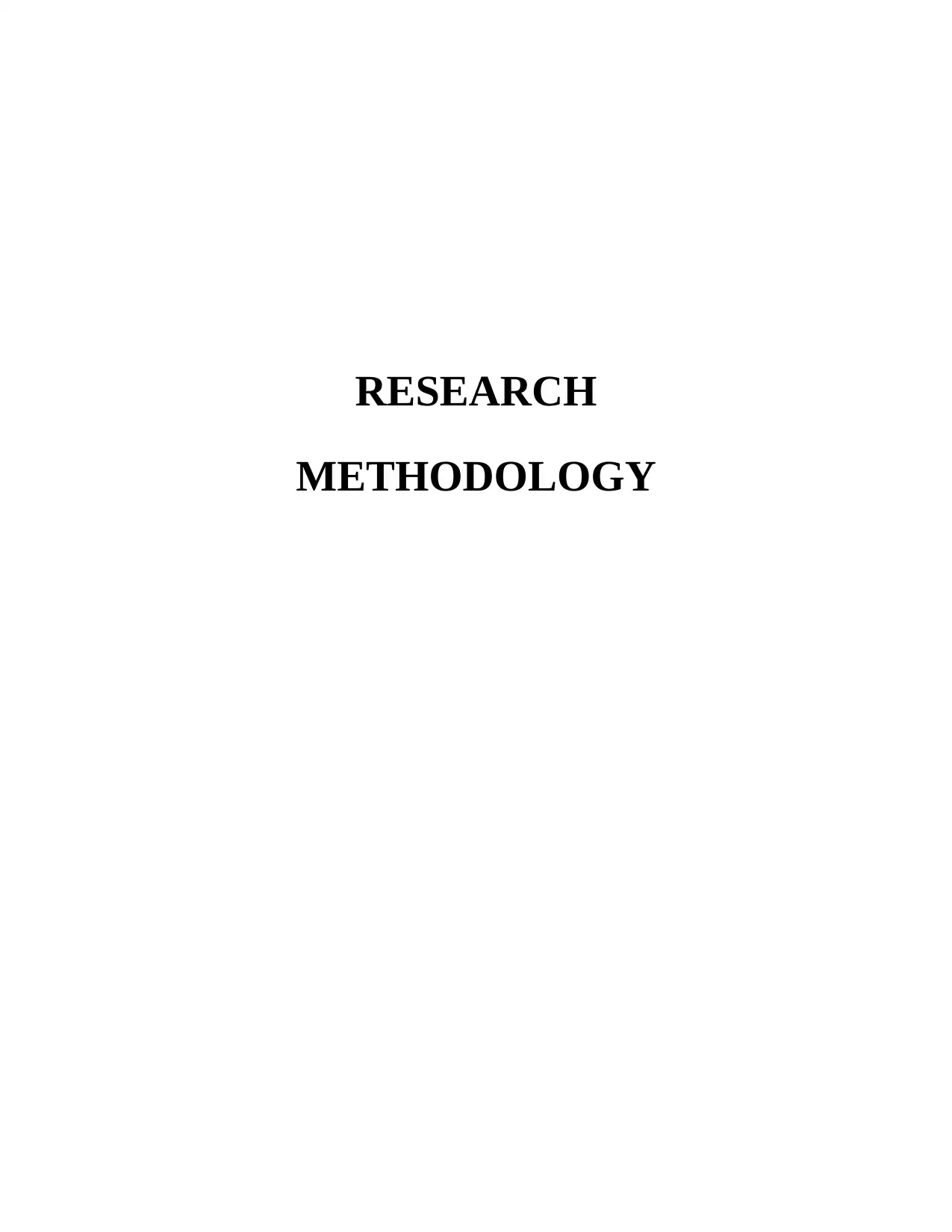
RESEARCH
METHODOLOGY
METHODOLOGY
Paraphrase This Document
Need a fresh take? Get an instant paraphrase of this document with our AI Paraphraser
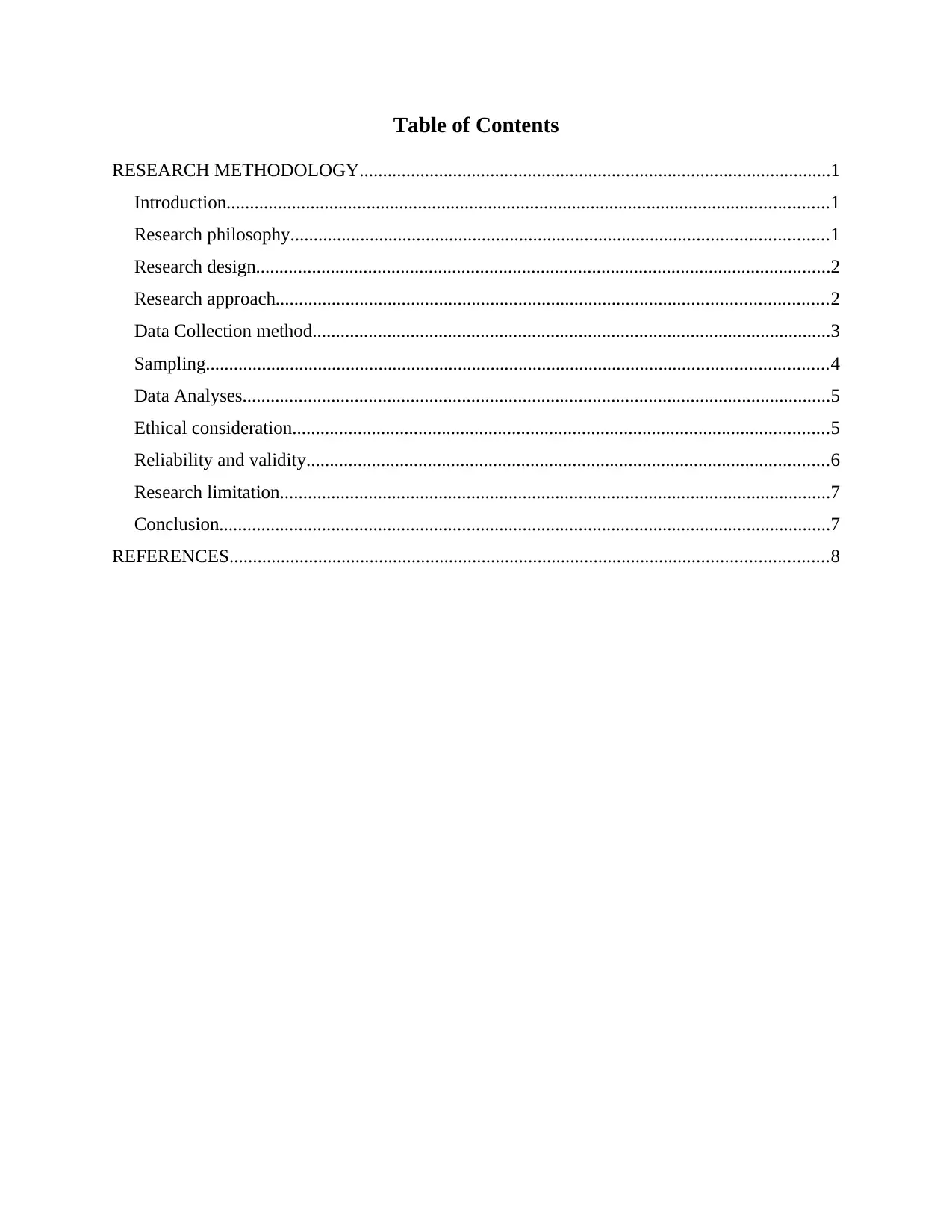
Table of Contents
RESEARCH METHODOLOGY.....................................................................................................1
Introduction.................................................................................................................................1
Research philosophy...................................................................................................................1
Research design...........................................................................................................................2
Research approach......................................................................................................................2
Data Collection method...............................................................................................................3
Sampling.....................................................................................................................................4
Data Analyses..............................................................................................................................5
Ethical consideration...................................................................................................................5
Reliability and validity................................................................................................................6
Research limitation......................................................................................................................7
Conclusion...................................................................................................................................7
REFERENCES................................................................................................................................8
RESEARCH METHODOLOGY.....................................................................................................1
Introduction.................................................................................................................................1
Research philosophy...................................................................................................................1
Research design...........................................................................................................................2
Research approach......................................................................................................................2
Data Collection method...............................................................................................................3
Sampling.....................................................................................................................................4
Data Analyses..............................................................................................................................5
Ethical consideration...................................................................................................................5
Reliability and validity................................................................................................................6
Research limitation......................................................................................................................7
Conclusion...................................................................................................................................7
REFERENCES................................................................................................................................8
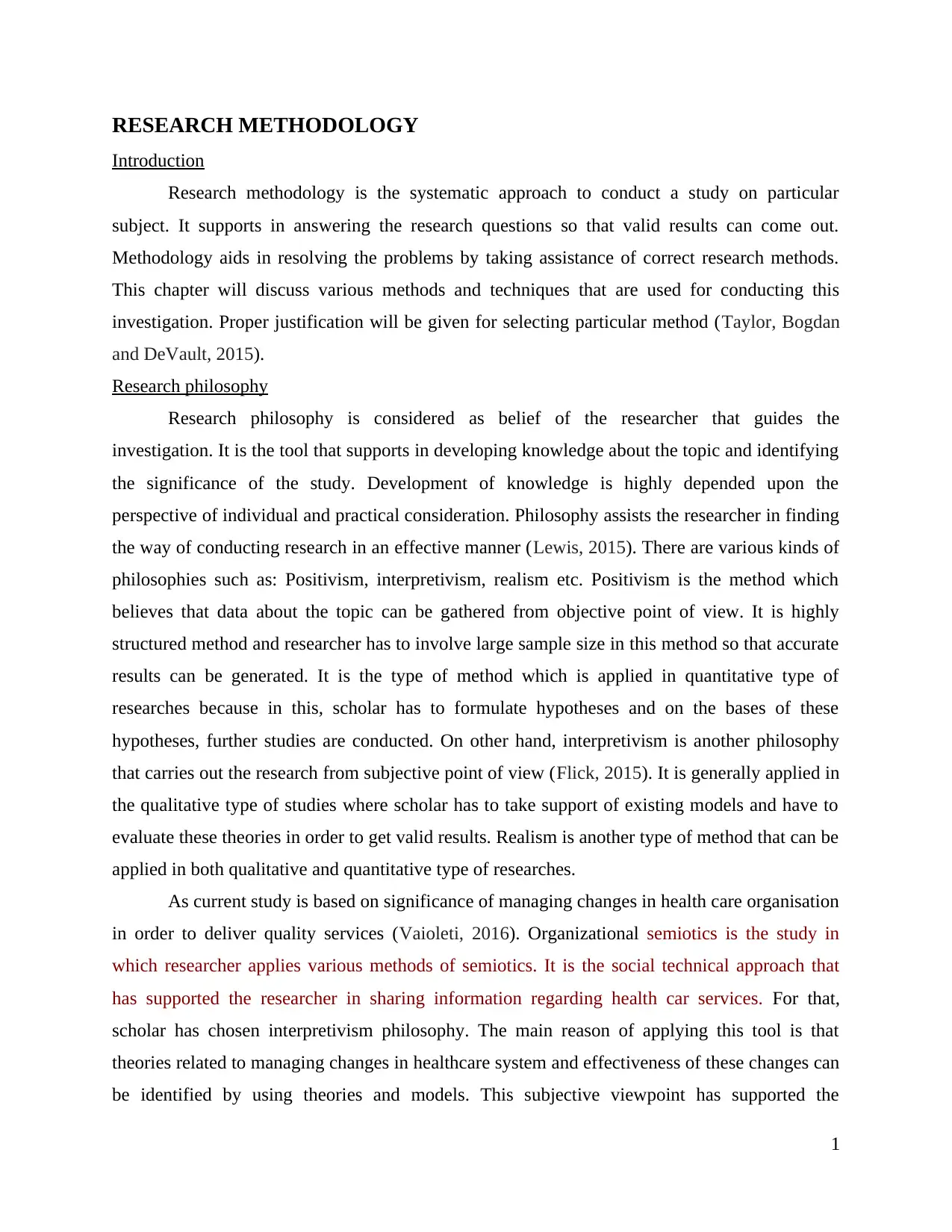
RESEARCH METHODOLOGY
Introduction
Research methodology is the systematic approach to conduct a study on particular
subject. It supports in answering the research questions so that valid results can come out.
Methodology aids in resolving the problems by taking assistance of correct research methods.
This chapter will discuss various methods and techniques that are used for conducting this
investigation. Proper justification will be given for selecting particular method (Taylor, Bogdan
and DeVault, 2015).
Research philosophy
Research philosophy is considered as belief of the researcher that guides the
investigation. It is the tool that supports in developing knowledge about the topic and identifying
the significance of the study. Development of knowledge is highly depended upon the
perspective of individual and practical consideration. Philosophy assists the researcher in finding
the way of conducting research in an effective manner (Lewis, 2015). There are various kinds of
philosophies such as: Positivism, interpretivism, realism etc. Positivism is the method which
believes that data about the topic can be gathered from objective point of view. It is highly
structured method and researcher has to involve large sample size in this method so that accurate
results can be generated. It is the type of method which is applied in quantitative type of
researches because in this, scholar has to formulate hypotheses and on the bases of these
hypotheses, further studies are conducted. On other hand, interpretivism is another philosophy
that carries out the research from subjective point of view (Flick, 2015). It is generally applied in
the qualitative type of studies where scholar has to take support of existing models and have to
evaluate these theories in order to get valid results. Realism is another type of method that can be
applied in both qualitative and quantitative type of researches.
As current study is based on significance of managing changes in health care organisation
in order to deliver quality services (Vaioleti, 2016). Organizational semiotics is the study in
which researcher applies various methods of semiotics. It is the social technical approach that
has supported the researcher in sharing information regarding health car services. For that,
scholar has chosen interpretivism philosophy. The main reason of applying this tool is that
theories related to managing changes in healthcare system and effectiveness of these changes can
be identified by using theories and models. This subjective viewpoint has supported the
1
Introduction
Research methodology is the systematic approach to conduct a study on particular
subject. It supports in answering the research questions so that valid results can come out.
Methodology aids in resolving the problems by taking assistance of correct research methods.
This chapter will discuss various methods and techniques that are used for conducting this
investigation. Proper justification will be given for selecting particular method (Taylor, Bogdan
and DeVault, 2015).
Research philosophy
Research philosophy is considered as belief of the researcher that guides the
investigation. It is the tool that supports in developing knowledge about the topic and identifying
the significance of the study. Development of knowledge is highly depended upon the
perspective of individual and practical consideration. Philosophy assists the researcher in finding
the way of conducting research in an effective manner (Lewis, 2015). There are various kinds of
philosophies such as: Positivism, interpretivism, realism etc. Positivism is the method which
believes that data about the topic can be gathered from objective point of view. It is highly
structured method and researcher has to involve large sample size in this method so that accurate
results can be generated. It is the type of method which is applied in quantitative type of
researches because in this, scholar has to formulate hypotheses and on the bases of these
hypotheses, further studies are conducted. On other hand, interpretivism is another philosophy
that carries out the research from subjective point of view (Flick, 2015). It is generally applied in
the qualitative type of studies where scholar has to take support of existing models and have to
evaluate these theories in order to get valid results. Realism is another type of method that can be
applied in both qualitative and quantitative type of researches.
As current study is based on significance of managing changes in health care organisation
in order to deliver quality services (Vaioleti, 2016). Organizational semiotics is the study in
which researcher applies various methods of semiotics. It is the social technical approach that
has supported the researcher in sharing information regarding health car services. For that,
scholar has chosen interpretivism philosophy. The main reason of applying this tool is that
theories related to managing changes in healthcare system and effectiveness of these changes can
be identified by using theories and models. This subjective viewpoint has supported the
1
⊘ This is a preview!⊘
Do you want full access?
Subscribe today to unlock all pages.

Trusted by 1+ million students worldwide
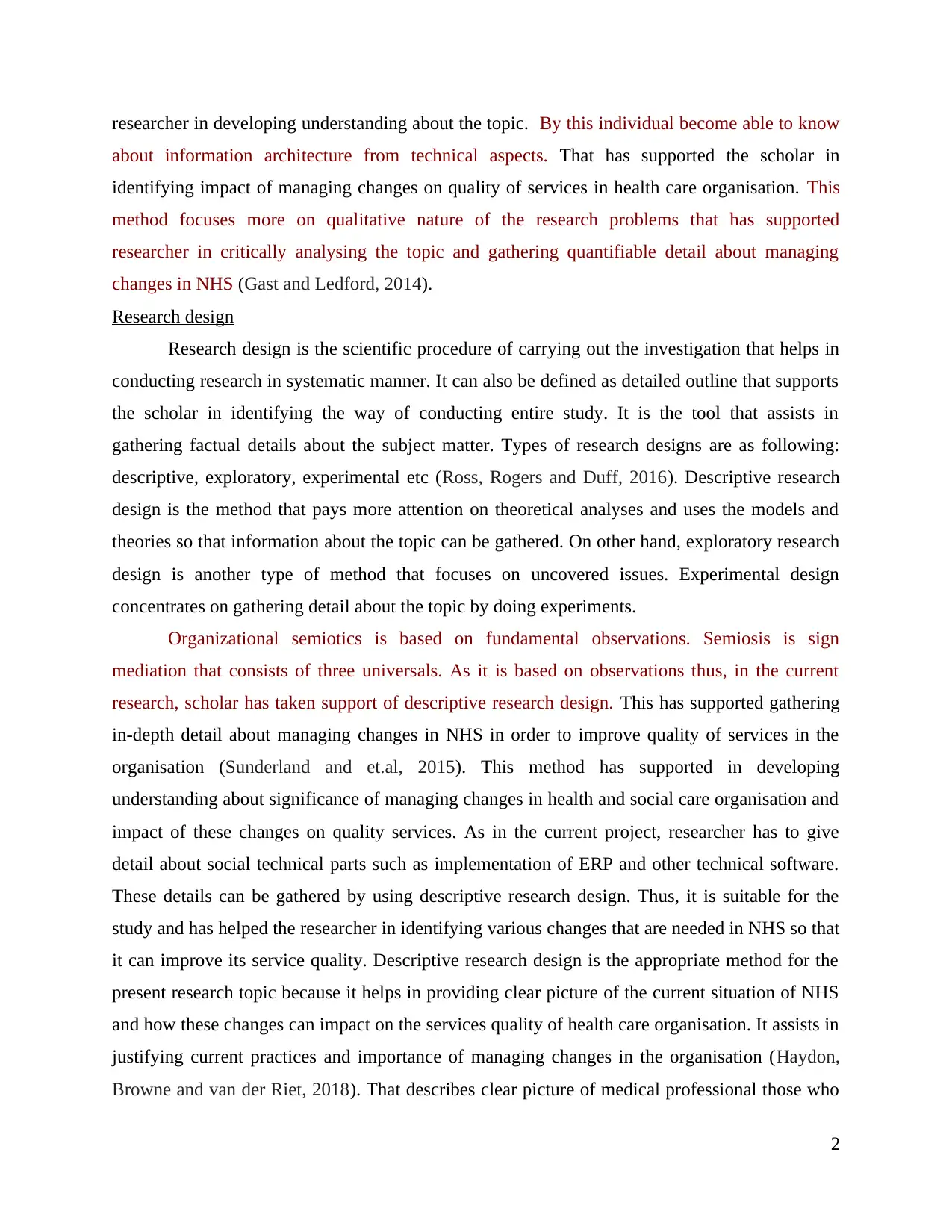
researcher in developing understanding about the topic. By this individual become able to know
about information architecture from technical aspects. That has supported the scholar in
identifying impact of managing changes on quality of services in health care organisation. This
method focuses more on qualitative nature of the research problems that has supported
researcher in critically analysing the topic and gathering quantifiable detail about managing
changes in NHS (Gast and Ledford, 2014).
Research design
Research design is the scientific procedure of carrying out the investigation that helps in
conducting research in systematic manner. It can also be defined as detailed outline that supports
the scholar in identifying the way of conducting entire study. It is the tool that assists in
gathering factual details about the subject matter. Types of research designs are as following:
descriptive, exploratory, experimental etc (Ross, Rogers and Duff, 2016). Descriptive research
design is the method that pays more attention on theoretical analyses and uses the models and
theories so that information about the topic can be gathered. On other hand, exploratory research
design is another type of method that focuses on uncovered issues. Experimental design
concentrates on gathering detail about the topic by doing experiments.
Organizational semiotics is based on fundamental observations. Semiosis is sign
mediation that consists of three universals. As it is based on observations thus, in the current
research, scholar has taken support of descriptive research design. This has supported gathering
in-depth detail about managing changes in NHS in order to improve quality of services in the
organisation (Sunderland and et.al, 2015). This method has supported in developing
understanding about significance of managing changes in health and social care organisation and
impact of these changes on quality services. As in the current project, researcher has to give
detail about social technical parts such as implementation of ERP and other technical software.
These details can be gathered by using descriptive research design. Thus, it is suitable for the
study and has helped the researcher in identifying various changes that are needed in NHS so that
it can improve its service quality. Descriptive research design is the appropriate method for the
present research topic because it helps in providing clear picture of the current situation of NHS
and how these changes can impact on the services quality of health care organisation. It assists in
justifying current practices and importance of managing changes in the organisation (Haydon,
Browne and van der Riet, 2018). That describes clear picture of medical professional those who
2
about information architecture from technical aspects. That has supported the scholar in
identifying impact of managing changes on quality of services in health care organisation. This
method focuses more on qualitative nature of the research problems that has supported
researcher in critically analysing the topic and gathering quantifiable detail about managing
changes in NHS (Gast and Ledford, 2014).
Research design
Research design is the scientific procedure of carrying out the investigation that helps in
conducting research in systematic manner. It can also be defined as detailed outline that supports
the scholar in identifying the way of conducting entire study. It is the tool that assists in
gathering factual details about the subject matter. Types of research designs are as following:
descriptive, exploratory, experimental etc (Ross, Rogers and Duff, 2016). Descriptive research
design is the method that pays more attention on theoretical analyses and uses the models and
theories so that information about the topic can be gathered. On other hand, exploratory research
design is another type of method that focuses on uncovered issues. Experimental design
concentrates on gathering detail about the topic by doing experiments.
Organizational semiotics is based on fundamental observations. Semiosis is sign
mediation that consists of three universals. As it is based on observations thus, in the current
research, scholar has taken support of descriptive research design. This has supported gathering
in-depth detail about managing changes in NHS in order to improve quality of services in the
organisation (Sunderland and et.al, 2015). This method has supported in developing
understanding about significance of managing changes in health and social care organisation and
impact of these changes on quality services. As in the current project, researcher has to give
detail about social technical parts such as implementation of ERP and other technical software.
These details can be gathered by using descriptive research design. Thus, it is suitable for the
study and has helped the researcher in identifying various changes that are needed in NHS so that
it can improve its service quality. Descriptive research design is the appropriate method for the
present research topic because it helps in providing clear picture of the current situation of NHS
and how these changes can impact on the services quality of health care organisation. It assists in
justifying current practices and importance of managing changes in the organisation (Haydon,
Browne and van der Riet, 2018). That describes clear picture of medical professional those who
2
Paraphrase This Document
Need a fresh take? Get an instant paraphrase of this document with our AI Paraphraser
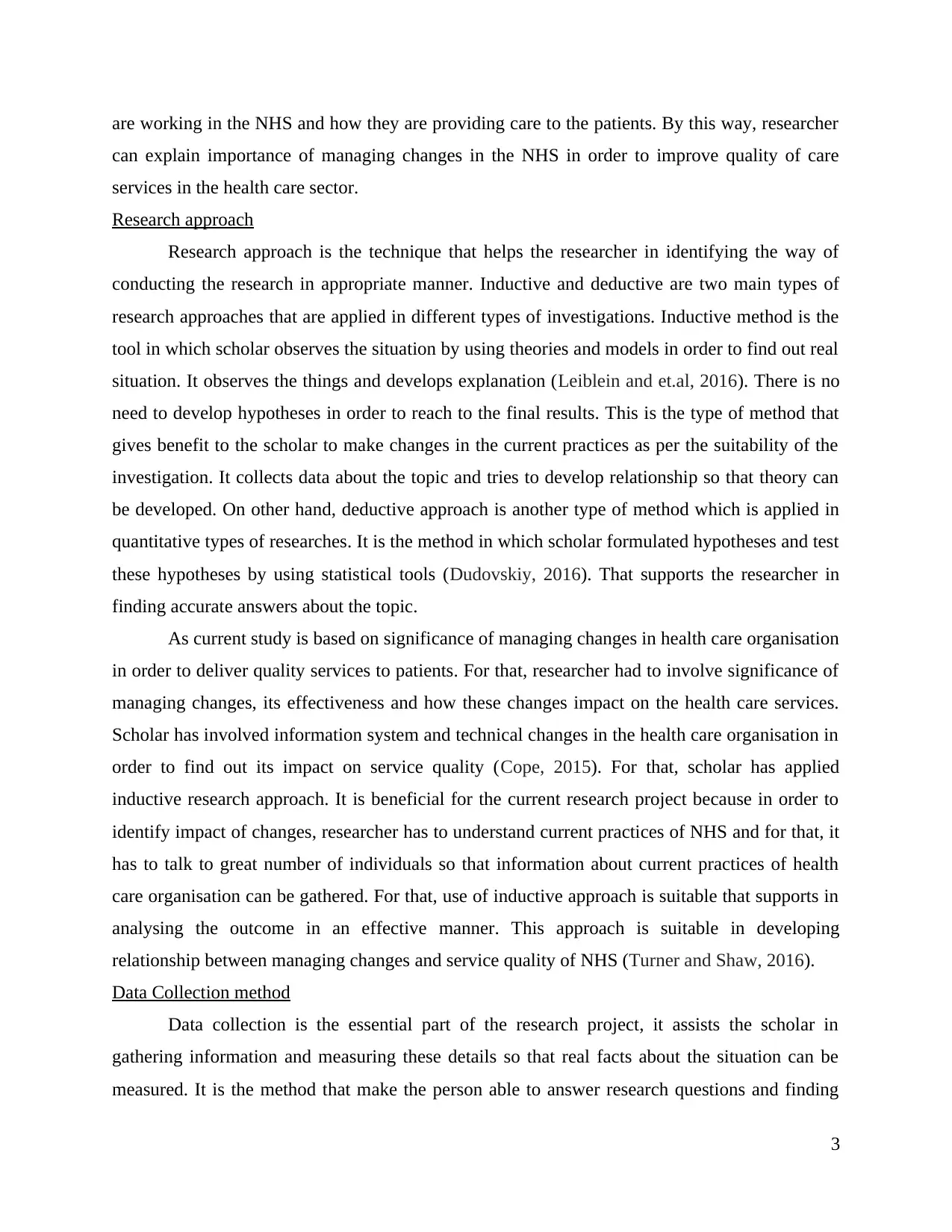
are working in the NHS and how they are providing care to the patients. By this way, researcher
can explain importance of managing changes in the NHS in order to improve quality of care
services in the health care sector.
Research approach
Research approach is the technique that helps the researcher in identifying the way of
conducting the research in appropriate manner. Inductive and deductive are two main types of
research approaches that are applied in different types of investigations. Inductive method is the
tool in which scholar observes the situation by using theories and models in order to find out real
situation. It observes the things and develops explanation (Leiblein and et.al, 2016). There is no
need to develop hypotheses in order to reach to the final results. This is the type of method that
gives benefit to the scholar to make changes in the current practices as per the suitability of the
investigation. It collects data about the topic and tries to develop relationship so that theory can
be developed. On other hand, deductive approach is another type of method which is applied in
quantitative types of researches. It is the method in which scholar formulated hypotheses and test
these hypotheses by using statistical tools (Dudovskiy, 2016). That supports the researcher in
finding accurate answers about the topic.
As current study is based on significance of managing changes in health care organisation
in order to deliver quality services to patients. For that, researcher had to involve significance of
managing changes, its effectiveness and how these changes impact on the health care services.
Scholar has involved information system and technical changes in the health care organisation in
order to find out its impact on service quality (Cope, 2015). For that, scholar has applied
inductive research approach. It is beneficial for the current research project because in order to
identify impact of changes, researcher has to understand current practices of NHS and for that, it
has to talk to great number of individuals so that information about current practices of health
care organisation can be gathered. For that, use of inductive approach is suitable that supports in
analysing the outcome in an effective manner. This approach is suitable in developing
relationship between managing changes and service quality of NHS (Turner and Shaw, 2016).
Data Collection method
Data collection is the essential part of the research project, it assists the scholar in
gathering information and measuring these details so that real facts about the situation can be
measured. It is the method that make the person able to answer research questions and finding
3
can explain importance of managing changes in the NHS in order to improve quality of care
services in the health care sector.
Research approach
Research approach is the technique that helps the researcher in identifying the way of
conducting the research in appropriate manner. Inductive and deductive are two main types of
research approaches that are applied in different types of investigations. Inductive method is the
tool in which scholar observes the situation by using theories and models in order to find out real
situation. It observes the things and develops explanation (Leiblein and et.al, 2016). There is no
need to develop hypotheses in order to reach to the final results. This is the type of method that
gives benefit to the scholar to make changes in the current practices as per the suitability of the
investigation. It collects data about the topic and tries to develop relationship so that theory can
be developed. On other hand, deductive approach is another type of method which is applied in
quantitative types of researches. It is the method in which scholar formulated hypotheses and test
these hypotheses by using statistical tools (Dudovskiy, 2016). That supports the researcher in
finding accurate answers about the topic.
As current study is based on significance of managing changes in health care organisation
in order to deliver quality services to patients. For that, researcher had to involve significance of
managing changes, its effectiveness and how these changes impact on the health care services.
Scholar has involved information system and technical changes in the health care organisation in
order to find out its impact on service quality (Cope, 2015). For that, scholar has applied
inductive research approach. It is beneficial for the current research project because in order to
identify impact of changes, researcher has to understand current practices of NHS and for that, it
has to talk to great number of individuals so that information about current practices of health
care organisation can be gathered. For that, use of inductive approach is suitable that supports in
analysing the outcome in an effective manner. This approach is suitable in developing
relationship between managing changes and service quality of NHS (Turner and Shaw, 2016).
Data Collection method
Data collection is the essential part of the research project, it assists the scholar in
gathering information and measuring these details so that real facts about the situation can be
measured. It is the method that make the person able to answer research questions and finding
3
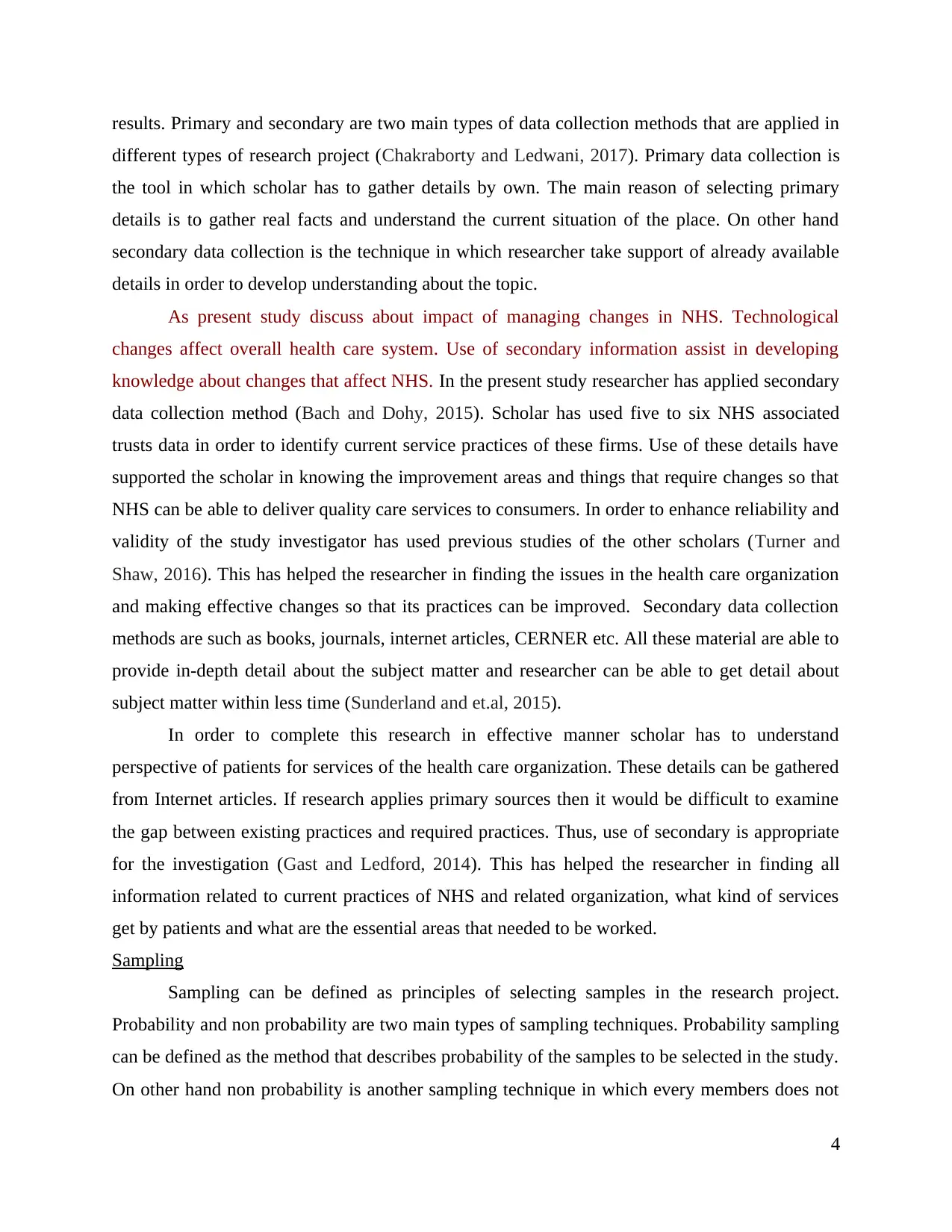
results. Primary and secondary are two main types of data collection methods that are applied in
different types of research project (Chakraborty and Ledwani, 2017). Primary data collection is
the tool in which scholar has to gather details by own. The main reason of selecting primary
details is to gather real facts and understand the current situation of the place. On other hand
secondary data collection is the technique in which researcher take support of already available
details in order to develop understanding about the topic.
As present study discuss about impact of managing changes in NHS. Technological
changes affect overall health care system. Use of secondary information assist in developing
knowledge about changes that affect NHS. In the present study researcher has applied secondary
data collection method (Bach and Dohy, 2015). Scholar has used five to six NHS associated
trusts data in order to identify current service practices of these firms. Use of these details have
supported the scholar in knowing the improvement areas and things that require changes so that
NHS can be able to deliver quality care services to consumers. In order to enhance reliability and
validity of the study investigator has used previous studies of the other scholars (Turner and
Shaw, 2016). This has helped the researcher in finding the issues in the health care organization
and making effective changes so that its practices can be improved. Secondary data collection
methods are such as books, journals, internet articles, CERNER etc. All these material are able to
provide in-depth detail about the subject matter and researcher can be able to get detail about
subject matter within less time (Sunderland and et.al, 2015).
In order to complete this research in effective manner scholar has to understand
perspective of patients for services of the health care organization. These details can be gathered
from Internet articles. If research applies primary sources then it would be difficult to examine
the gap between existing practices and required practices. Thus, use of secondary is appropriate
for the investigation (Gast and Ledford, 2014). This has helped the researcher in finding all
information related to current practices of NHS and related organization, what kind of services
get by patients and what are the essential areas that needed to be worked.
Sampling
Sampling can be defined as principles of selecting samples in the research project.
Probability and non probability are two main types of sampling techniques. Probability sampling
can be defined as the method that describes probability of the samples to be selected in the study.
On other hand non probability is another sampling technique in which every members does not
4
different types of research project (Chakraborty and Ledwani, 2017). Primary data collection is
the tool in which scholar has to gather details by own. The main reason of selecting primary
details is to gather real facts and understand the current situation of the place. On other hand
secondary data collection is the technique in which researcher take support of already available
details in order to develop understanding about the topic.
As present study discuss about impact of managing changes in NHS. Technological
changes affect overall health care system. Use of secondary information assist in developing
knowledge about changes that affect NHS. In the present study researcher has applied secondary
data collection method (Bach and Dohy, 2015). Scholar has used five to six NHS associated
trusts data in order to identify current service practices of these firms. Use of these details have
supported the scholar in knowing the improvement areas and things that require changes so that
NHS can be able to deliver quality care services to consumers. In order to enhance reliability and
validity of the study investigator has used previous studies of the other scholars (Turner and
Shaw, 2016). This has helped the researcher in finding the issues in the health care organization
and making effective changes so that its practices can be improved. Secondary data collection
methods are such as books, journals, internet articles, CERNER etc. All these material are able to
provide in-depth detail about the subject matter and researcher can be able to get detail about
subject matter within less time (Sunderland and et.al, 2015).
In order to complete this research in effective manner scholar has to understand
perspective of patients for services of the health care organization. These details can be gathered
from Internet articles. If research applies primary sources then it would be difficult to examine
the gap between existing practices and required practices. Thus, use of secondary is appropriate
for the investigation (Gast and Ledford, 2014). This has helped the researcher in finding all
information related to current practices of NHS and related organization, what kind of services
get by patients and what are the essential areas that needed to be worked.
Sampling
Sampling can be defined as principles of selecting samples in the research project.
Probability and non probability are two main types of sampling techniques. Probability sampling
can be defined as the method that describes probability of the samples to be selected in the study.
On other hand non probability is another sampling technique in which every members does not
4
⊘ This is a preview!⊘
Do you want full access?
Subscribe today to unlock all pages.

Trusted by 1+ million students worldwide
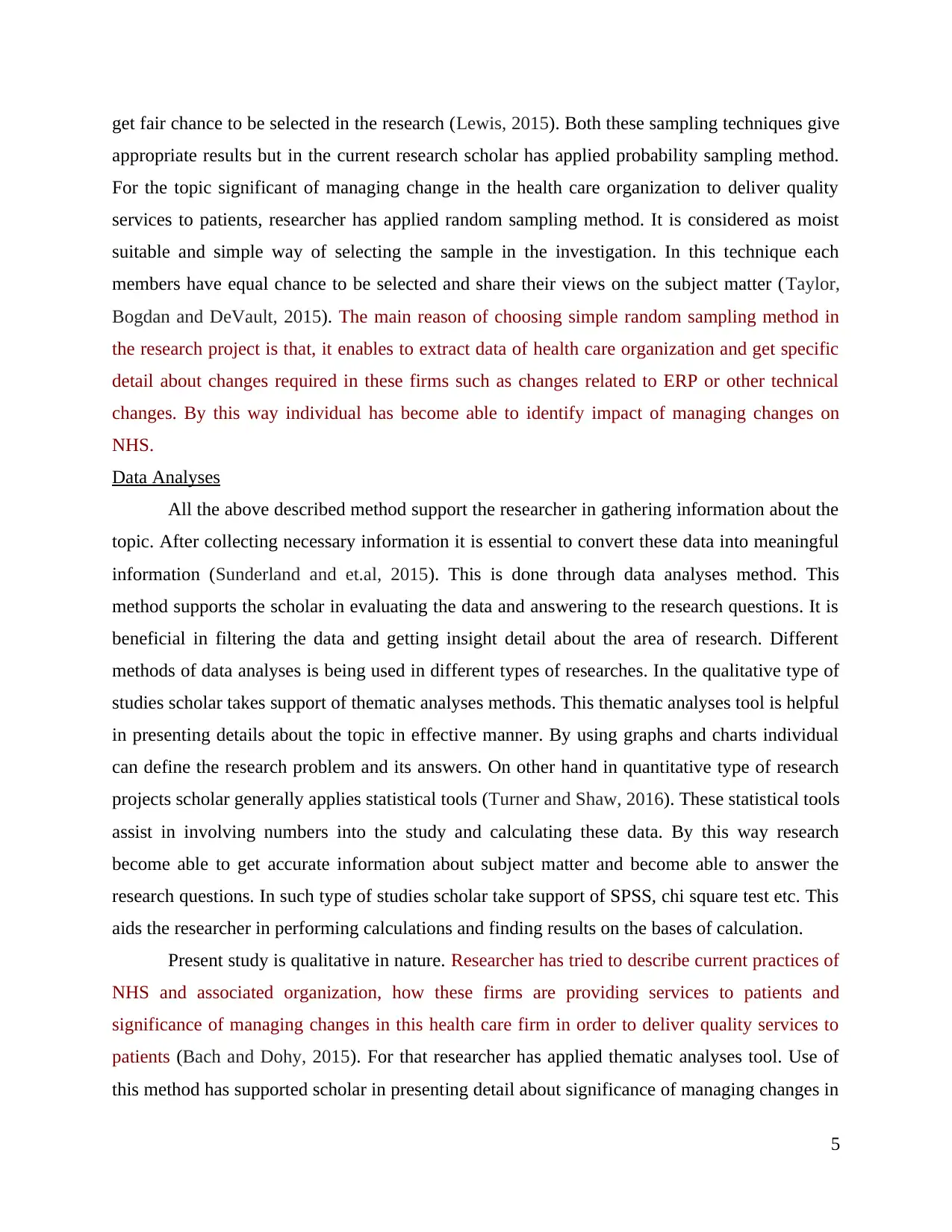
get fair chance to be selected in the research (Lewis, 2015). Both these sampling techniques give
appropriate results but in the current research scholar has applied probability sampling method.
For the topic significant of managing change in the health care organization to deliver quality
services to patients, researcher has applied random sampling method. It is considered as moist
suitable and simple way of selecting the sample in the investigation. In this technique each
members have equal chance to be selected and share their views on the subject matter (Taylor,
Bogdan and DeVault, 2015). The main reason of choosing simple random sampling method in
the research project is that, it enables to extract data of health care organization and get specific
detail about changes required in these firms such as changes related to ERP or other technical
changes. By this way individual has become able to identify impact of managing changes on
NHS.
Data Analyses
All the above described method support the researcher in gathering information about the
topic. After collecting necessary information it is essential to convert these data into meaningful
information (Sunderland and et.al, 2015). This is done through data analyses method. This
method supports the scholar in evaluating the data and answering to the research questions. It is
beneficial in filtering the data and getting insight detail about the area of research. Different
methods of data analyses is being used in different types of researches. In the qualitative type of
studies scholar takes support of thematic analyses methods. This thematic analyses tool is helpful
in presenting details about the topic in effective manner. By using graphs and charts individual
can define the research problem and its answers. On other hand in quantitative type of research
projects scholar generally applies statistical tools (Turner and Shaw, 2016). These statistical tools
assist in involving numbers into the study and calculating these data. By this way research
become able to get accurate information about subject matter and become able to answer the
research questions. In such type of studies scholar take support of SPSS, chi square test etc. This
aids the researcher in performing calculations and finding results on the bases of calculation.
Present study is qualitative in nature. Researcher has tried to describe current practices of
NHS and associated organization, how these firms are providing services to patients and
significance of managing changes in this health care firm in order to deliver quality services to
patients (Bach and Dohy, 2015). For that researcher has applied thematic analyses tool. Use of
this method has supported scholar in presenting detail about significance of managing changes in
5
appropriate results but in the current research scholar has applied probability sampling method.
For the topic significant of managing change in the health care organization to deliver quality
services to patients, researcher has applied random sampling method. It is considered as moist
suitable and simple way of selecting the sample in the investigation. In this technique each
members have equal chance to be selected and share their views on the subject matter (Taylor,
Bogdan and DeVault, 2015). The main reason of choosing simple random sampling method in
the research project is that, it enables to extract data of health care organization and get specific
detail about changes required in these firms such as changes related to ERP or other technical
changes. By this way individual has become able to identify impact of managing changes on
NHS.
Data Analyses
All the above described method support the researcher in gathering information about the
topic. After collecting necessary information it is essential to convert these data into meaningful
information (Sunderland and et.al, 2015). This is done through data analyses method. This
method supports the scholar in evaluating the data and answering to the research questions. It is
beneficial in filtering the data and getting insight detail about the area of research. Different
methods of data analyses is being used in different types of researches. In the qualitative type of
studies scholar takes support of thematic analyses methods. This thematic analyses tool is helpful
in presenting details about the topic in effective manner. By using graphs and charts individual
can define the research problem and its answers. On other hand in quantitative type of research
projects scholar generally applies statistical tools (Turner and Shaw, 2016). These statistical tools
assist in involving numbers into the study and calculating these data. By this way research
become able to get accurate information about subject matter and become able to answer the
research questions. In such type of studies scholar take support of SPSS, chi square test etc. This
aids the researcher in performing calculations and finding results on the bases of calculation.
Present study is qualitative in nature. Researcher has tried to describe current practices of
NHS and associated organization, how these firms are providing services to patients and
significance of managing changes in this health care firm in order to deliver quality services to
patients (Bach and Dohy, 2015). For that researcher has applied thematic analyses tool. Use of
this method has supported scholar in presenting detail about significance of managing changes in
5
Paraphrase This Document
Need a fresh take? Get an instant paraphrase of this document with our AI Paraphraser
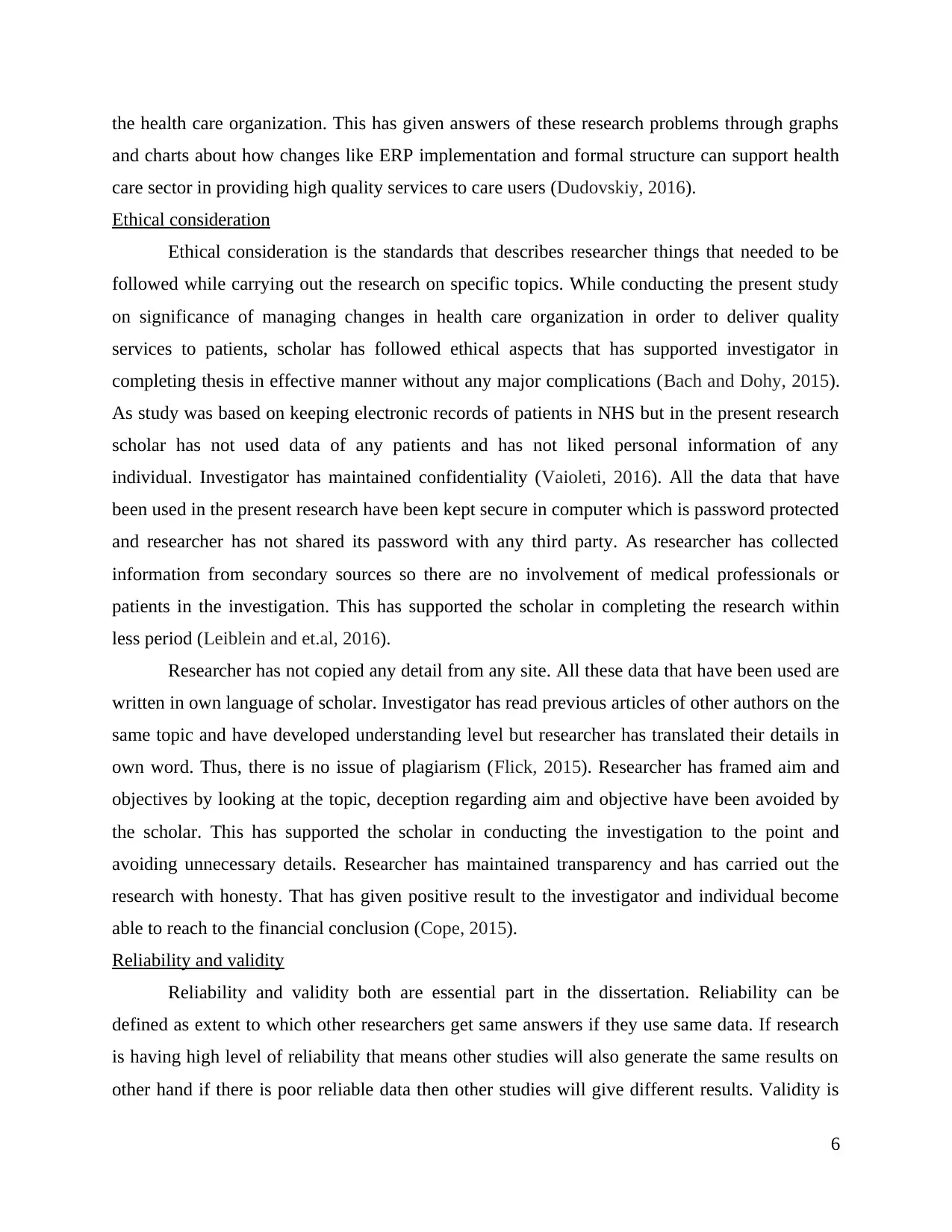
the health care organization. This has given answers of these research problems through graphs
and charts about how changes like ERP implementation and formal structure can support health
care sector in providing high quality services to care users (Dudovskiy, 2016).
Ethical consideration
Ethical consideration is the standards that describes researcher things that needed to be
followed while carrying out the research on specific topics. While conducting the present study
on significance of managing changes in health care organization in order to deliver quality
services to patients, scholar has followed ethical aspects that has supported investigator in
completing thesis in effective manner without any major complications (Bach and Dohy, 2015).
As study was based on keeping electronic records of patients in NHS but in the present research
scholar has not used data of any patients and has not liked personal information of any
individual. Investigator has maintained confidentiality (Vaioleti, 2016). All the data that have
been used in the present research have been kept secure in computer which is password protected
and researcher has not shared its password with any third party. As researcher has collected
information from secondary sources so there are no involvement of medical professionals or
patients in the investigation. This has supported the scholar in completing the research within
less period (Leiblein and et.al, 2016).
Researcher has not copied any detail from any site. All these data that have been used are
written in own language of scholar. Investigator has read previous articles of other authors on the
same topic and have developed understanding level but researcher has translated their details in
own word. Thus, there is no issue of plagiarism (Flick, 2015). Researcher has framed aim and
objectives by looking at the topic, deception regarding aim and objective have been avoided by
the scholar. This has supported the scholar in conducting the investigation to the point and
avoiding unnecessary details. Researcher has maintained transparency and has carried out the
research with honesty. That has given positive result to the investigator and individual become
able to reach to the financial conclusion (Cope, 2015).
Reliability and validity
Reliability and validity both are essential part in the dissertation. Reliability can be
defined as extent to which other researchers get same answers if they use same data. If research
is having high level of reliability that means other studies will also generate the same results on
other hand if there is poor reliable data then other studies will give different results. Validity is
6
and charts about how changes like ERP implementation and formal structure can support health
care sector in providing high quality services to care users (Dudovskiy, 2016).
Ethical consideration
Ethical consideration is the standards that describes researcher things that needed to be
followed while carrying out the research on specific topics. While conducting the present study
on significance of managing changes in health care organization in order to deliver quality
services to patients, scholar has followed ethical aspects that has supported investigator in
completing thesis in effective manner without any major complications (Bach and Dohy, 2015).
As study was based on keeping electronic records of patients in NHS but in the present research
scholar has not used data of any patients and has not liked personal information of any
individual. Investigator has maintained confidentiality (Vaioleti, 2016). All the data that have
been used in the present research have been kept secure in computer which is password protected
and researcher has not shared its password with any third party. As researcher has collected
information from secondary sources so there are no involvement of medical professionals or
patients in the investigation. This has supported the scholar in completing the research within
less period (Leiblein and et.al, 2016).
Researcher has not copied any detail from any site. All these data that have been used are
written in own language of scholar. Investigator has read previous articles of other authors on the
same topic and have developed understanding level but researcher has translated their details in
own word. Thus, there is no issue of plagiarism (Flick, 2015). Researcher has framed aim and
objectives by looking at the topic, deception regarding aim and objective have been avoided by
the scholar. This has supported the scholar in conducting the investigation to the point and
avoiding unnecessary details. Researcher has maintained transparency and has carried out the
research with honesty. That has given positive result to the investigator and individual become
able to reach to the financial conclusion (Cope, 2015).
Reliability and validity
Reliability and validity both are essential part in the dissertation. Reliability can be
defined as extent to which other researchers get same answers if they use same data. If research
is having high level of reliability that means other studies will also generate the same results on
other hand if there is poor reliable data then other studies will give different results. Validity is
6
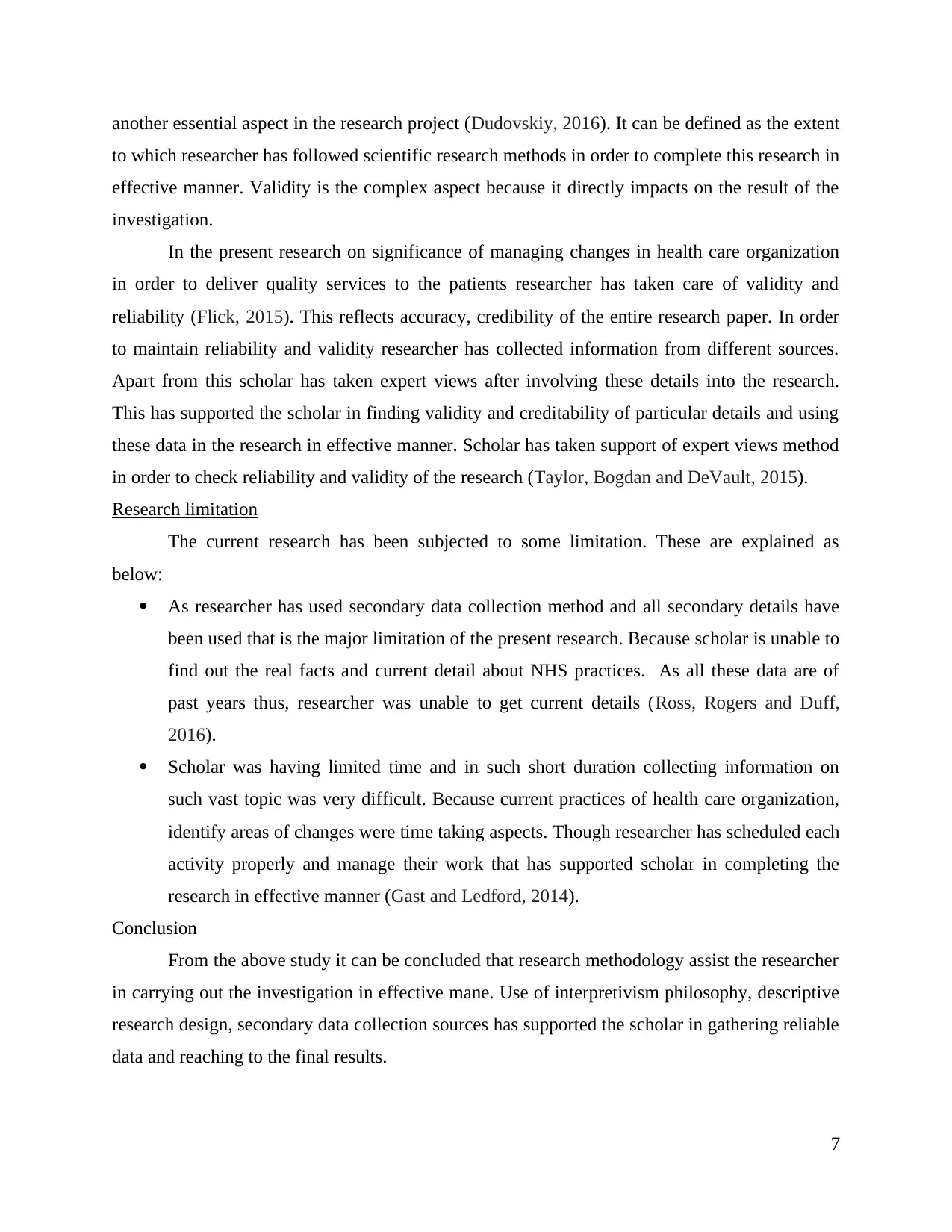
another essential aspect in the research project (Dudovskiy, 2016). It can be defined as the extent
to which researcher has followed scientific research methods in order to complete this research in
effective manner. Validity is the complex aspect because it directly impacts on the result of the
investigation.
In the present research on significance of managing changes in health care organization
in order to deliver quality services to the patients researcher has taken care of validity and
reliability (Flick, 2015). This reflects accuracy, credibility of the entire research paper. In order
to maintain reliability and validity researcher has collected information from different sources.
Apart from this scholar has taken expert views after involving these details into the research.
This has supported the scholar in finding validity and creditability of particular details and using
these data in the research in effective manner. Scholar has taken support of expert views method
in order to check reliability and validity of the research (Taylor, Bogdan and DeVault, 2015).
Research limitation
The current research has been subjected to some limitation. These are explained as
below:
As researcher has used secondary data collection method and all secondary details have
been used that is the major limitation of the present research. Because scholar is unable to
find out the real facts and current detail about NHS practices. As all these data are of
past years thus, researcher was unable to get current details (Ross, Rogers and Duff,
2016).
Scholar was having limited time and in such short duration collecting information on
such vast topic was very difficult. Because current practices of health care organization,
identify areas of changes were time taking aspects. Though researcher has scheduled each
activity properly and manage their work that has supported scholar in completing the
research in effective manner (Gast and Ledford, 2014).
Conclusion
From the above study it can be concluded that research methodology assist the researcher
in carrying out the investigation in effective mane. Use of interpretivism philosophy, descriptive
research design, secondary data collection sources has supported the scholar in gathering reliable
data and reaching to the final results.
7
to which researcher has followed scientific research methods in order to complete this research in
effective manner. Validity is the complex aspect because it directly impacts on the result of the
investigation.
In the present research on significance of managing changes in health care organization
in order to deliver quality services to the patients researcher has taken care of validity and
reliability (Flick, 2015). This reflects accuracy, credibility of the entire research paper. In order
to maintain reliability and validity researcher has collected information from different sources.
Apart from this scholar has taken expert views after involving these details into the research.
This has supported the scholar in finding validity and creditability of particular details and using
these data in the research in effective manner. Scholar has taken support of expert views method
in order to check reliability and validity of the research (Taylor, Bogdan and DeVault, 2015).
Research limitation
The current research has been subjected to some limitation. These are explained as
below:
As researcher has used secondary data collection method and all secondary details have
been used that is the major limitation of the present research. Because scholar is unable to
find out the real facts and current detail about NHS practices. As all these data are of
past years thus, researcher was unable to get current details (Ross, Rogers and Duff,
2016).
Scholar was having limited time and in such short duration collecting information on
such vast topic was very difficult. Because current practices of health care organization,
identify areas of changes were time taking aspects. Though researcher has scheduled each
activity properly and manage their work that has supported scholar in completing the
research in effective manner (Gast and Ledford, 2014).
Conclusion
From the above study it can be concluded that research methodology assist the researcher
in carrying out the investigation in effective mane. Use of interpretivism philosophy, descriptive
research design, secondary data collection sources has supported the scholar in gathering reliable
data and reaching to the final results.
7
⊘ This is a preview!⊘
Do you want full access?
Subscribe today to unlock all pages.

Trusted by 1+ million students worldwide

8
Paraphrase This Document
Need a fresh take? Get an instant paraphrase of this document with our AI Paraphraser
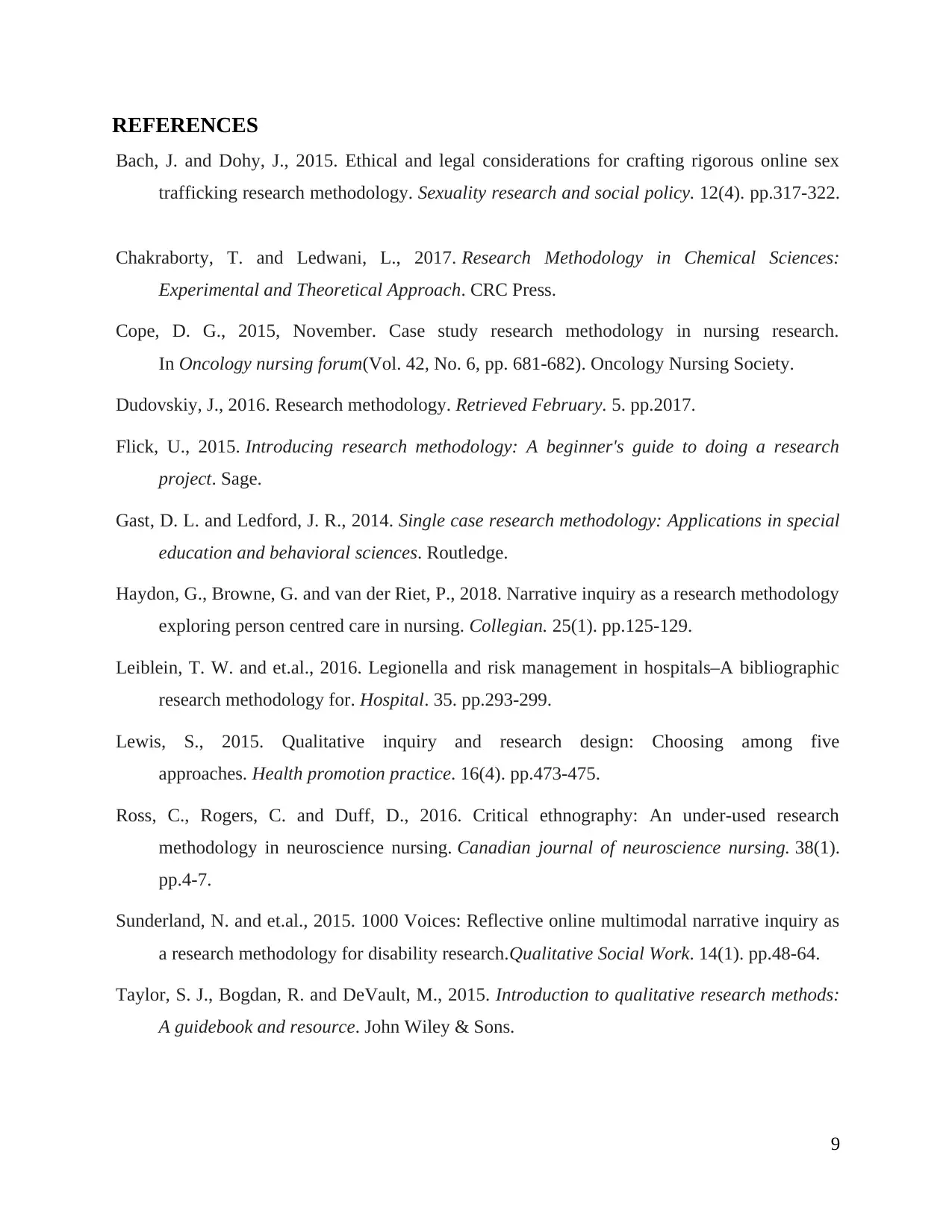
REFERENCES
Bach, J. and Dohy, J., 2015. Ethical and legal considerations for crafting rigorous online sex
trafficking research methodology. Sexuality research and social policy. 12(4). pp.317-322.
Chakraborty, T. and Ledwani, L., 2017. Research Methodology in Chemical Sciences:
Experimental and Theoretical Approach. CRC Press.
Cope, D. G., 2015, November. Case study research methodology in nursing research.
In Oncology nursing forum(Vol. 42, No. 6, pp. 681-682). Oncology Nursing Society.
Dudovskiy, J., 2016. Research methodology. Retrieved February. 5. pp.2017.
Flick, U., 2015. Introducing research methodology: A beginner's guide to doing a research
project. Sage.
Gast, D. L. and Ledford, J. R., 2014. Single case research methodology: Applications in special
education and behavioral sciences. Routledge.
Haydon, G., Browne, G. and van der Riet, P., 2018. Narrative inquiry as a research methodology
exploring person centred care in nursing. Collegian. 25(1). pp.125-129.
Leiblein, T. W. and et.al., 2016. Legionella and risk management in hospitals–A bibliographic
research methodology for. Hospital. 35. pp.293-299.
Lewis, S., 2015. Qualitative inquiry and research design: Choosing among five
approaches. Health promotion practice. 16(4). pp.473-475.
Ross, C., Rogers, C. and Duff, D., 2016. Critical ethnography: An under-used research
methodology in neuroscience nursing. Canadian journal of neuroscience nursing. 38(1).
pp.4-7.
Sunderland, N. and et.al., 2015. 1000 Voices: Reflective online multimodal narrative inquiry as
a research methodology for disability research.Qualitative Social Work. 14(1). pp.48-64.
Taylor, S. J., Bogdan, R. and DeVault, M., 2015. Introduction to qualitative research methods:
A guidebook and resource. John Wiley & Sons.
9
Bach, J. and Dohy, J., 2015. Ethical and legal considerations for crafting rigorous online sex
trafficking research methodology. Sexuality research and social policy. 12(4). pp.317-322.
Chakraborty, T. and Ledwani, L., 2017. Research Methodology in Chemical Sciences:
Experimental and Theoretical Approach. CRC Press.
Cope, D. G., 2015, November. Case study research methodology in nursing research.
In Oncology nursing forum(Vol. 42, No. 6, pp. 681-682). Oncology Nursing Society.
Dudovskiy, J., 2016. Research methodology. Retrieved February. 5. pp.2017.
Flick, U., 2015. Introducing research methodology: A beginner's guide to doing a research
project. Sage.
Gast, D. L. and Ledford, J. R., 2014. Single case research methodology: Applications in special
education and behavioral sciences. Routledge.
Haydon, G., Browne, G. and van der Riet, P., 2018. Narrative inquiry as a research methodology
exploring person centred care in nursing. Collegian. 25(1). pp.125-129.
Leiblein, T. W. and et.al., 2016. Legionella and risk management in hospitals–A bibliographic
research methodology for. Hospital. 35. pp.293-299.
Lewis, S., 2015. Qualitative inquiry and research design: Choosing among five
approaches. Health promotion practice. 16(4). pp.473-475.
Ross, C., Rogers, C. and Duff, D., 2016. Critical ethnography: An under-used research
methodology in neuroscience nursing. Canadian journal of neuroscience nursing. 38(1).
pp.4-7.
Sunderland, N. and et.al., 2015. 1000 Voices: Reflective online multimodal narrative inquiry as
a research methodology for disability research.Qualitative Social Work. 14(1). pp.48-64.
Taylor, S. J., Bogdan, R. and DeVault, M., 2015. Introduction to qualitative research methods:
A guidebook and resource. John Wiley & Sons.
9
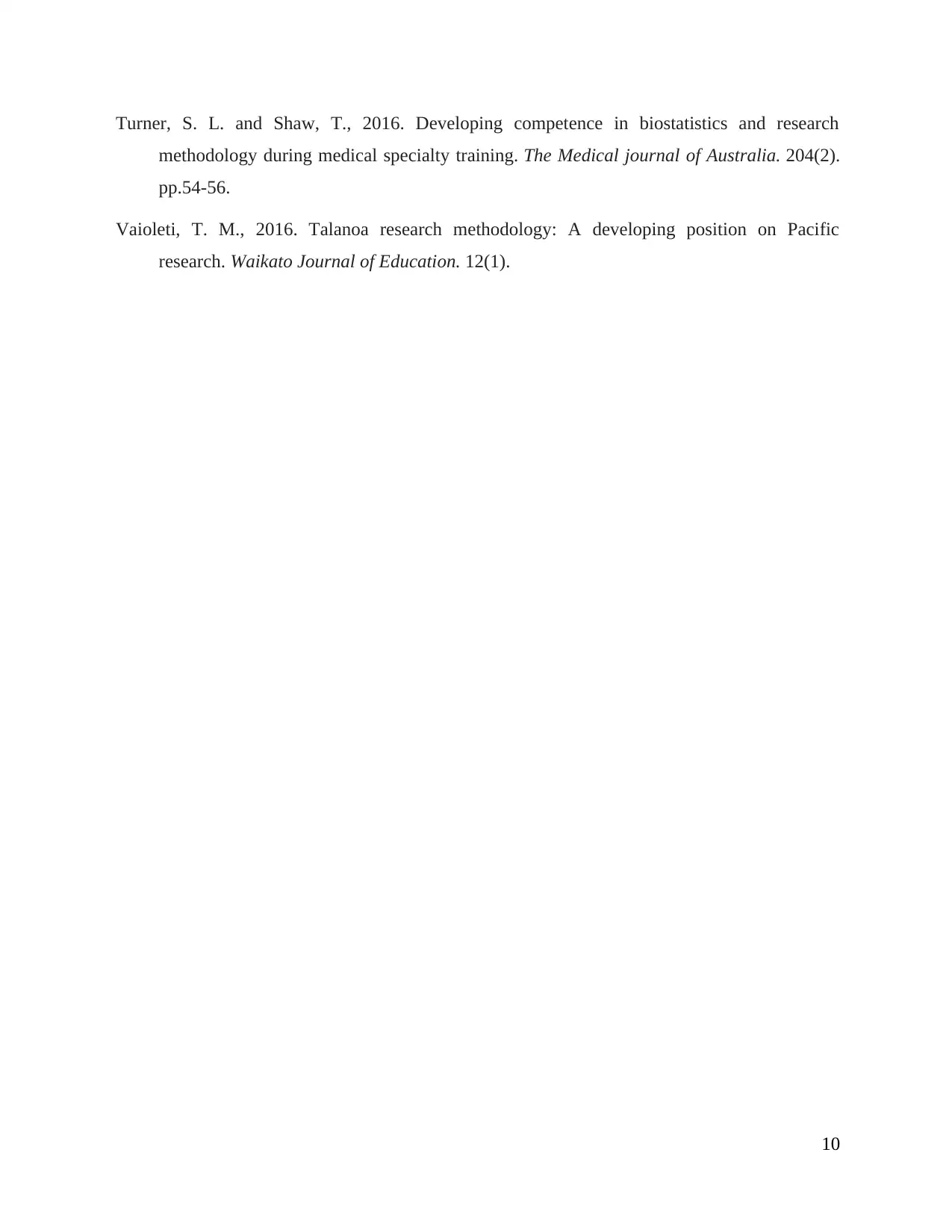
Turner, S. L. and Shaw, T., 2016. Developing competence in biostatistics and research
methodology during medical specialty training. The Medical journal of Australia. 204(2).
pp.54-56.
Vaioleti, T. M., 2016. Talanoa research methodology: A developing position on Pacific
research. Waikato Journal of Education. 12(1).
10
methodology during medical specialty training. The Medical journal of Australia. 204(2).
pp.54-56.
Vaioleti, T. M., 2016. Talanoa research methodology: A developing position on Pacific
research. Waikato Journal of Education. 12(1).
10
⊘ This is a preview!⊘
Do you want full access?
Subscribe today to unlock all pages.

Trusted by 1+ million students worldwide
1 out of 12
Related Documents
Your All-in-One AI-Powered Toolkit for Academic Success.
+13062052269
info@desklib.com
Available 24*7 on WhatsApp / Email
![[object Object]](/_next/static/media/star-bottom.7253800d.svg)
Unlock your academic potential
Copyright © 2020–2026 A2Z Services. All Rights Reserved. Developed and managed by ZUCOL.





